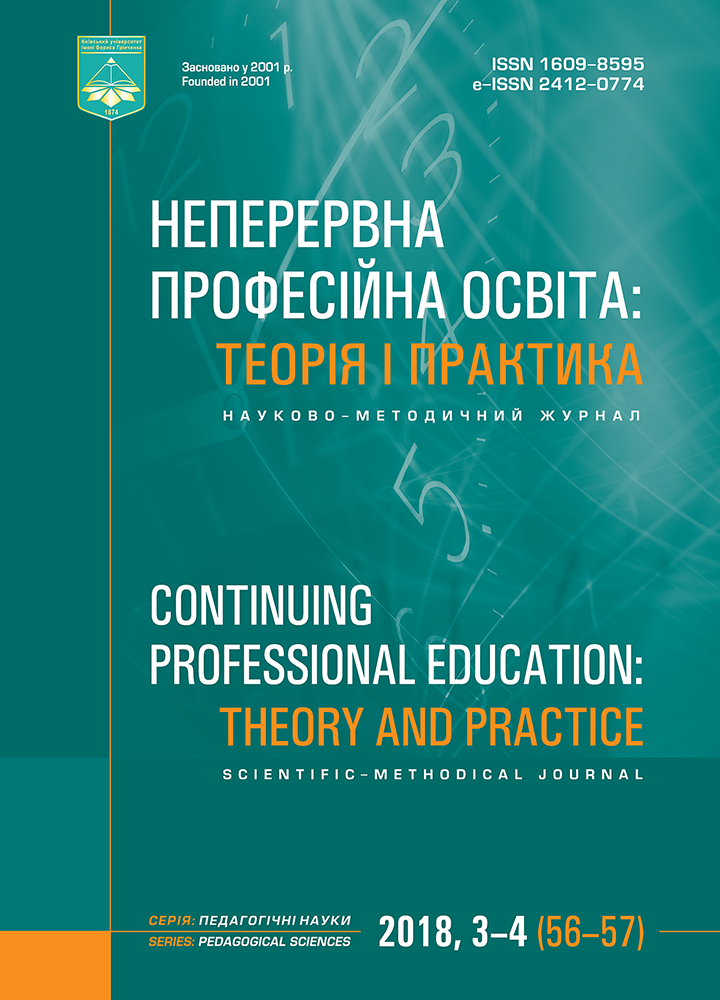FORMATION AND DEVELOPMENT OF THE CONCEPT OF «EMOTIONAL INTELLIGENCE»: A HISTORICALLY CONDITIONED PHILOSOPHICAL ANALYSIS
DOI:
https://doi.org/10.28925/1609-8595.2018.3-4.3642Keywords:
antiquity, emotional intelligence, emotions, philosophy, primitive society, reason, religion, thinkerAbstract
The article deals with the historically conditioned philosophical aspect of the formation and the development of the concept of «emotional intelligence» from the pre-Christian times to the Antiquity. This concept, as a complex of mental properties of an individual, was first formulated and introduced into the psychological theory by the US scholars P. Salovey and J. Mayer in 1990. However, the origins of ideas on the problem of the unity of the emotional and the rational can be found in religious and philosophical teachings. The Bible contains examples that testify to the role of intelligence in emotional self-regulation of a human being and confirm the existential, «emotional wisdom of mankind». Our research has proven that the idea of the relationship between emotions and the reason as the essential manifestations of an individual is recurrent at all stages of the history of mankind, its roots date back to the time of the primitive society. In various periods of history, that problem was interpreted differently depending on cultural-historical, religious and philosophical traditions, world outlook views regarding the role of human emotions and human reason in the cognizance of the surrounding world, the nature of their interconnection, and attributing parity or priority features to them. The mythical and pagan views of primitive people, their animistic beliefs testified to the undivided nature of their thinking, and were embodied in various visual-sensory forms of collective creativity that combined intellectual, emotional and volitional attitude to the world. As the human civilization developed and the social relationships changed, also changed mythological and philosophical views of primitive people that were opposed by the naive-spontaneous philosophical world outlook of ancient thinkers. The image and the symbol of the primitive society were supplanted by the Logos, i. e. the reason, by means of which the naive-spontaneous philosophy tried to solve world outlook problems. Still, the representatives of the Pythagorean philosophical school can claim the credit for using, for the first time, emotions as the basis for the comprehension of aesthetic phenomena. During that period, for the first time within the ancient Greek philosophy, aesthetic knowledge was formed, to which the notion of «sensuality» was central. The classical period of the ancient Greek philosophy testifies to the priority of the «rationalized world outlook» of the ancient philosophers, who approached the solution of the world outlook issues from the standpoint of reason.References
Alekseyeva, V. (1989). Esteticheskoye i hudozhestvennoye vospitaniye (k novym resheniyam) [Aesthetic and artistic education (towards new solutions)]. Novoe pedagogicheskoe myishlenie.Moscow,Russia: Pedagogika (rus).
Andreyeva, I.N. (2011). Emotsionalnyi intellekt kak fenomen sovremennoi psikhologii [Emotional Intelligence as a Phenomenon of the Modern Psychology].Novopolotsk,Belarus:PolotskStateUniversity (rus).
Animism [Animism] (2002). In V. I. Shynkaruk (head of the editorial board) et al, Fіlosofkyi entsyklopedychnyi slovnyk (pp. 97).Kyiv,Ukraine (ukr).
Huberskyi, L. V.; Nadolnyi, I. F.; Andruschenko, V. P. (2006). Fіlosofіya: navchalny posіbnyk [Philosophy: an Auxiliary Textbook].Kyiv,Ukraine: Vikar (ukr).
Darwin, C. (2001). O vyrazhenii emotsyi u cheloveka i zhivotnykh [The Expression of the Emotions in Man and Animals].Saint Petersburg,Russia: Piter (rus).
Karpov, A. V., Petrovskaya, A. S. (2008). Psikhologiya emotsionalnogo intellekta: teoriya, diagnostika, praktika: monografiya [Psychology of Emotional Intelligence: Theory, Diagnostics, Practice: a Monograph].Yaroslavl,Russia:YaroslavlStateUniversity (rus).
Kolesnikov, M. P., Kolesnikova, O. V., Lozovoi, V. O. (2003). Estetyka: navchalny posіbnyk [Aesthetics: an Auxiliary Textbook]. Kyiv,Ukraine: Yurinkom Inter (ukr).
Konovalchuk, V. (2015). Ontologіchnyi sens kordotsentrizmu u fіlosofіi osvіty [The Ontological Meaning of Cordocentrism in the Philosophy of Education]. Lyudinoznavchі studіi. Seriya: Filosofiya, 32, 200–211 (ukr).
Kremen, V. G., Ilyin, V. V. (2005). Fіlosofіya: myslytelі, іdei, kontseptsіyi [Philosophy: Thinkers, Ideas, Concepts].Kyiv,Ukraine: Knyga (ukr).
Lafrenière, P. (2004). Emotsionalnoye razvitiye detei i podrostkov [Emotional Development: The Organization of Emotional Life in the Early Years].Saint Petersburg,Russia: Praim-Yevroznak (rus).
Levchuk, L. T., Kucheryuk, D. Y., Panchenko, V. I.(1997). Estetyka [Aesthetics].Kyiv,Ukraine: Vyscha Shkola (ukr).
Lomov, B. F. (1984). Metodologicheskiye i teoreticheskiye problemy psikhologii [Methodological and Theoretical Problems of Psychology]. Moscow, Russia: Nauka (rus).
Marett, R. R. (1998). Formula tabu-mana kak minimum opredeleniya religii [The Formula of Taboo-Mana as a Minimum of the Definition of Religion]. Mistika. Religiya. Nauka. Klassiki mirovogo religiovedeniya. Antologiya.Moscow,Russia: Kanon+, 99–108 (rus).
Novikov, A. V. (1976). Ot pozitivizma k intuitivizmu. Kriticheskiye ocherki burzhuaznoi Estetiki [From Positivism to Intuitivism. Critical Essays on the Bourgeois Aesthetics]. Moscow,Russia: Iskusstvo (rus).
Ovsyannikov, M. F. (1988). Estetika v proshlom, nastoyaschem i buduschem: Iz istorii esteticheskoi mysli [The Aesthetics in the Past, the Present and the Future: From the History of Aesthetic Thought]. Moscow, Russia: Prosvescheniye (rus).
Prychepiy, Y. M., Cherniy, A. M., Chekan, L. A. (2005). Fіlosofіya [Philosophy]. Kyiv, Ukraine: Akademiya (ukr).
Radugin, A. A. (2000). Filosofiya: kurs lektsiy [Philosophy: a Course of Lectures].Moscow,Russia: Tsentr (rus).
Skrypchenko, O. V., Dolynska, L. V., Ohorodniychuk, Z. V. (2011). Zahalna psikhologіya [General Psychology].Kyiv,Ukraine: Karavela (ukr).
Spirkin, A. G. (2006). Filosofiya: Uchebnik [Philosophy: a Textbook].Moscow,Russia: Gardariki (rus).
Tylor, E. B. (1989). Pervobytnaya kultura [Primitive Culture].Moscow,Russia: Politizdat (rus).
Ushakov, D. V. (2004). Sotsialnyi intellekt kak vid intellekta [Social Intelligence as a Variety of Intelligence]. Sotsialnyi intellekt. Teoriya, izmereniye, issledovaniyа. Moscow,Russia:Institute ofPsychology of theRussianAcademy of Sciences, 11–28 (rus).
Fragmenty rannikh grecheskikh filosofov (1989). [Fragments of Writings of the Ancient Greek Philosophers] / Compiled by A. V. Lebedev.Moscow,Russia: Nauka. Part 1 (rus).
Freud, S. (1930). Nedovolstvo kulturoi [Civilization and Its Discontents]. Moscow, Russia (rus).
Cherniy, A. M. (2008). Relygіyeznavstvo [Religious studies]. Kyiv, Ukraine: Akademvydav (ukr).
Downloads
How to Cite
Issue
Section
License
Copyright (c) 2020 Lyudmyla Rakityanska

This work is licensed under a Creative Commons Attribution-NonCommercial 3.0 Unported License.



